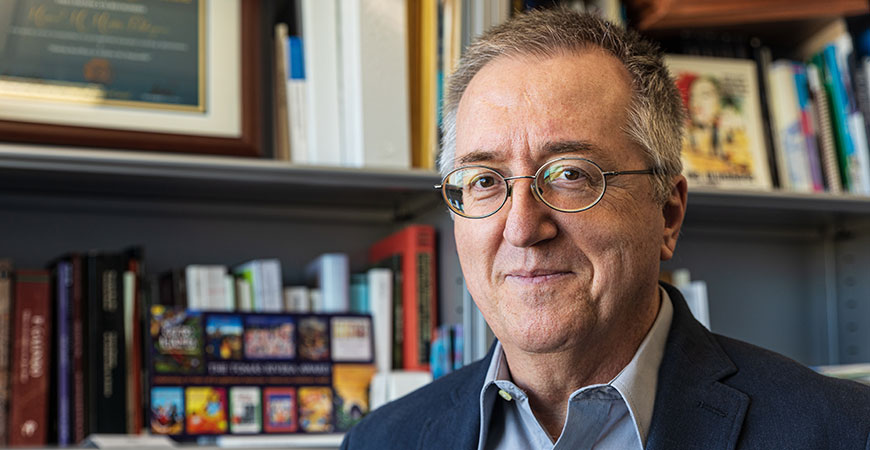
Founding faculty member and distinguished literature Professor Manuel M. Martín-Rodríguez is being honored for his contributions to Chicano/Latino studies with the Don Luis Leal award, considered the most important in the area of literary studies.
Martín-Rodríguez is the youngest scholar to receive the award, the first of his generation and the only one of the six awardees who is not Latinx; he is Spanish.
The award is given every two years by the Association for Studies on the Population of Hispanic Origin in the U.S. (HispaUSA), and is named for the late, eminent Chicanx literature scholar, an expert in Mexican literature at the University of Illinois Urbana-Champaign. After Leal retired, he was hired as a visiting professor at UC Santa Barbara, where Martín-Rodríguez earned his Ph.D. Leal switched from Mexican literature to Chicano studies just as the field was beginning and is considered one of the founders of the discipline.
“By naming its award Don Luis Leal, HispaUSA aims to recognize in those who receive the distinction the same human and scientific attributes that marked the figure of the prestigious professor,” according to the organization’s website. “The academic rigor of Don Luis Leal's research and writings was only comparable to his humanity and his tireless social commitment to his people.”
Martín-Rodríguez said he is honored to be in the company of the biggest names in the field: Nick Kanellos, María Herrera Sobeck, Gary Francisco Keller, Francisco Lomelí and Norma Cantú, experts in Chicano literature including poetry, film, folklore and feminist writings.
Martín-Rodríguez studies the intertextual connections between Chicano literature and other literary traditions, and he was the first scholar in the field to start studying Chicano literature from a different perspective: readership.
In 2015, he won the International Latino Book Award for Best Latino Focused Nonfiction Book for “With a Book in Their Hands: Chicano/a Readers and Readerships Across the Centuries.” He has authored nine books and contributed to countless others.
He also challenged the long-held belief among his fellow scholars that an epic poem from 1610 about an expedition that had not gone very well had not contributed in any meaningful way to the foundation of the field. He developed a reconstruction of who had read the poem and started delving into the author and why he chose this genre to talk about a failed endeavor, and made some breakthrough discoveries, which he published in both English and Spanish and in both literary and history journals.
While some of his fellow award recipients have founded small presses and journals, Martín-Rodríguez developed a virtual publishing house dedicated to publishing works that, for one reason or another, do not find a place in conventional publishers. Works by more than 20 writers, along with readers’ comments, can be read for free at alternaCtive publicaCtions.
He also created the “Visual History of Chicano Literature,” which makes accessible to its users the covers and bibliographic data of all the creative works written by Mexican-American or Chicano authors. He plans to incorporate data referring to the intertextual connections of each book, as well, according to the Academia Norteamericana de la Lengua Española (North American Academy of the Spanish Language), of which he is a member.
He will travel to Spain next year to receive the award during the biannual conference, to be held at Universidad de Santiago de Compostela.



